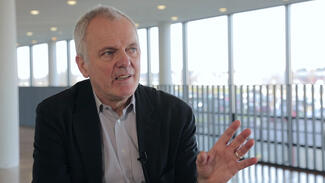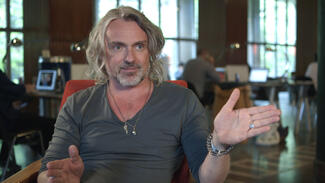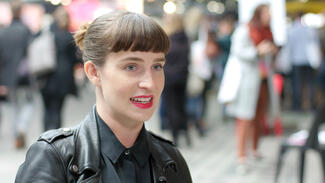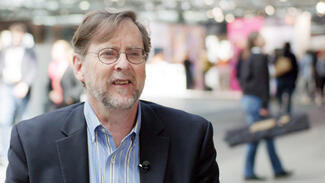Designing in future is to take what you imagined and transform to something that exists. Everything in-between is design.
Some of the design work will disappear very soon to automation because, I mean, we know how the body functions. We know more and more about the cognitive, understanding of the cognitivity of the brain, so computational design can happen to bootstrap designs. We don't have to do this by hand and how or where do they press, how do they look. So we need to move design from this traditional design to computational design, to design of the futures with the tools that enable us which is artificial intelligence and all these things. So design is changing face, it‘s a new thing. And I think maybe not everynody is aware about that in the design community that you design relationships. You design futures. The rest is actually easier than that. So start that. Don't design features, products. Design service to serve someone, so you gain a relationship. Start with the relationship, the rest will follow.
You can imagine possibilities in future. You can choose them and then you articulate them, so tell a story, narrate them. Make a movie, make a picture, write a paper. Tell that story, so you can have a conversation. And we articulate too little. We assume too much. We don't have a decent conversation with artefacts on the table that describe the possible futures. Now it's time, so design is changing shape from the traditional to this kind of designing the future and then even the computational design when the world is ... you can compute on the world because it's all connected. Everything that can be connected will be connected, and that's everything. So everything is digital and you can manipulate it. You can code worlds. Well, then you can design worlds. So computational design is another sphere that is opening up in front of our eyes right now.
What they do, they take ingredients on the map, they object the ingredients. Mobile telephony exists. Everybody's empowered. Social confirmation is a thing, right? They didn't create it, it's just objectively there, and then they built narratives, and to take it really far out in a scary way, it sells, it's a good drama to scare someone, to ask the question: Is this the future we want? Obviously not. That's the prerequisite for the Black Mirror, you know. The black reflection of humanity. What if everything goes wrong, right? And that's good because now we can start the conversation. This is a conversation piece like a piece of art. What does it mean? What questions does it ask? It's not an answer. If people watch Black Mirror as an answer they're doing something wrong. You should watch it as a question for how would you make it differently in extreme instead of this extreme negative, extremely positive way that you're talking? So yes, it's inspirational. Good discussion started.
We map objectively what's happening. Blockchain is happening, right? Machine learning is happening. We could look at it and just say this is happening. Globalization is happening. Different business models are happening there, fine. Put them on a map. And it's very nice because then you can have a map of possibilities. Because as soon as you put things on a map you see how they relate to each other. Or could relate. So you draw lines and you connect these dots, and they become narratives. So we will have 3 billion new minds connected to internet enabled with fantastic technologies, 3 billion, just in, say, 5 years because of technology accessibility. These people, statistically, there should be an Einstein somewhere there, right? Could be a Hasso Plattner, could be an Elon Musk, whoever. A new Marie Curie. These people will then create new start-ups, new business models. They will be enabled. The authorities moving ... that's a narrative. I'm just taking that narrative because it's possible from the dots. Now we write these narratives, that's the next step, and it's full spectrum. Some of them are very dystopian, and Hollywood is great at that. Newspapers are great at that. Eat this and you will die. Everybody's gonna take your job. You know, all that bullshit. They are possible. They are unlikely, and they sell well because our brain is wired for fear. So you have all these spectrums. And you choose to focus on the absolute positive ones, the impactful positive ones. We do this too little. And a brain is wired also like that, when you tell people a narrative they go for it. So choose the positive one to tell them like: Hey, how about going to the moon within 10 years and bring the guy back? It's a good narrative, right? And people just did. How about having a system that you can talk to and have a conversation about your business where it actually handles your ambiguity, saying: Hey system, how am I doing today? It's a superhard question to answer unless you know me. Hey, how about a system that knows me? That's a hard problem we are working on it, it's a nice narrative. When you choose the positive ones then you can see where am I gifted as an organisation, as a team, as a person? Where are my gifts to actually actualize this to make it happen, is it us, is it these guys, can we hook up with them or should we just leave it to them? And then you choose where you can have a very positive impact with that narrative you chose to persue? Then you have a strategy. People usually start with strategies, and that's a little bit late. The hard work is before. What are the right things to do? When you have a strategy you focus on doing the things right. People are used to do things right. How we look at the What and the Why, and that's important.
So we have a pretty pretentios bald vision, you know, to make the world run better and improve people's lives. Wow! So that should get you up on Monday morning. How am I going to improve people's lives? Not only for the customer but the customer must be enabled to improve their customers' or consumers' lives in some way. How can we reduce the friction and how can we simplify the complexity with the help of thorough design, empathy, innovation and systems and technologies that help people to live better, stay in a flow where they can be the optimal them. Better and better, growing, so the flow is actually pointing upwards. So I sometimes say even that, you know, technology helps us to focus on more human tasks like conversation, like ideation, like creating new futures, like imagining new business models. These things machines can yet not do well because they are hard to digitize. Exchange experiences, reach consensus, solve complex human problems for businesses and for relationships with your customers and so on. That's human work. But now we can be argumented with the machines. The super-human abilities are now reachable for us. And we can automate everything that was friction from a way where it was repeatable, where it was mundane and sometimes really boring actually. So that friction is also gone. We can have ... so the best system in the world, the smartest system is the one that makes you smarter. Human is always in the centre. So now maybe if you prolong it to some kind of philosophical extent maybe we become human at last. Maybe we are something we don't know yet that we can be. You know, the Homo sapiens has been busy hunting and gathering all these years, well, a little bit more, been some other industrial revolutions since then. But in the essence maybe we are reaching a state where we can liberate the human and the human gifts, for example, at work to a level we haven't imagined yet. And that purpose and that diversity of thought that we have together makes this a very unique space to innovate for the future and design new futures.



